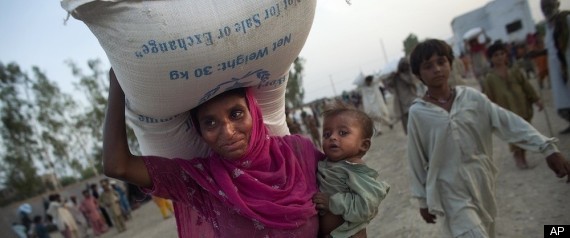
KARIN LAUB 01/17/11
Associated Press writer Nasser Shiyoukhi contributed to this report from Hebron, West Bank
RAMALLAH, West Bank — The World Food Programme is nearly $3 billion short this year in its fight against global hunger, and the gap is likely to grow if food prices keep rising, the head of the U.N. agency said in an interview Monday.
Josette Sheeran said the shortfall amounts to almost half of what the agency needs.
Sheeran spoke to The Associated Press after touring the Palestinian city of Hebron, where she inspected an electronic food voucher project meant to streamline distribution of food to the needy.
The system was first tried out in the West Bank in 2009 and has since been introduced in several other places.
"Part of why I have come to the Palestinian territories is to send the message to the world that we are in a funding crisis," Sheeran told the AP. The U.N.'s front line agency against hunger relies on voluntary contributions from governments, corporations and individuals. The agency needs about $6 billion this year, but is about $2.8 billion short, Sheeran said.
"When people are hungry, they only have three options – they revolt, they migrate or they die," she said, adding that it's more cost effective to prevent hunger than to deal with its consequences.
Sheeran said the funding shortfall is likely to grow, since the current figures have not taken into account another food crisis, a possibility raised by the World Bank and others.
Hunger has been on the rise since the financial and food crises of 2008, she said, and more than 1 billion people are reduced to one meal a day.
"If food prices escalate again, the most vulnerable in the world will lose the one meal a day they are having," she said. "If food prices double, that means one meal every two days."
Sheeran carries with her a red plastic cup to illustrate how little it would take to ensure children don't go to school hungry. It would cost about one euro to fill that cup once a day for a week, she said.
The future is at stake, she said. Children who get at least one daily meal stay in school and study better.
In the West Bank, about 75,000 school children benefit from the program. Instead of a cup of food, they get milk and a date bar made in Saudi Arabia. The aim is to find a local producer to help boost the struggling Palestinian economy, Sheeran said.
The West Bank has been a testing ground for the electronic food voucher, a debit card with which beneficiaries buy their staples when they need them at local stores, rather than having to report to distribution centers at fixed times.
The electronic vouchers have since been introduced elsewhere, including among Iraqi refugees in Syria and in the Philippines.
The vouchers work in urban areas where food is available but those relying on aid can't afford to buy it. The system cuts down on transport costs, brings more business to participating stores and injects more demand into the local economy, agency officials said.
http://www.huffingtonpost.com/2011/01/17/world-hunger-un-warning_n_810077.html











No comments:
Post a Comment